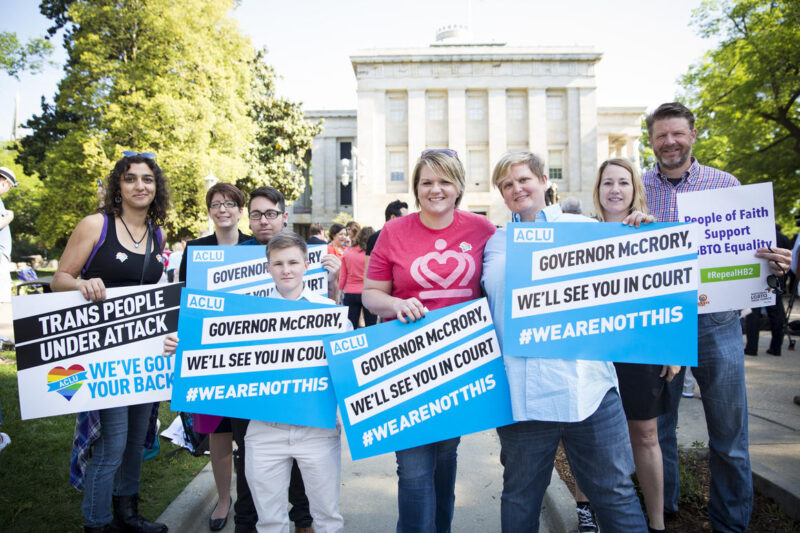
Today marks a pivotal fight in the restroom wars. This morning, we will ask a federal judge to suspend North Carolina’s hateful anti-transgender law, known as HB2, which requires transgender people in all public buildings to use restrooms that accord with the gender on their birth certificate, regardless of their gender identity. Simply put, the law bars transgender people from participation in public life.
For our client, JoaquĂn Carcaño, a project coordinator at the University of North Carolina at Chapel Hill, HB2 means he can’t use the men’s room at work. As a man, Joaquin can’t use the women’s room without causing confusion and consternation among the women there, as well as undermining his very identity. But because he is transgender and lives in North Carolina, HB2 requires that he use a restroom that matches his birth certificate – the female restroom. So, like many other transgender people, Joaquin avoids drinking liquids during the day so he doesn’t have to pee at work. Imagine trying to do that.
JoaquĂn is one of several plaintiffs in Carcaño v. McCrory, the legal challenge to HB2 brought by the ACLU, the ACLU of North Carolina, and Lambda Legal. Today the judge hears argument on our motion for a preliminary injunction, and trial is set for November.
The restroom debates are not just a battleground for the LGBT movement, they are an opportunity. For a long time, LGBT advocates avoided conversations about single-sex spaces. But we must engage America about restrooms if we’re going to make progress on protecting transgender people from discrimination. This is our chance to explain to the country who transgender people are, why restroom restrictions bar them from full participation in public life, and how no privacy or safety interests are violated in the process. That’s where JoaquĂn and his fellow plaintiffs come in – they can humanize this issue and help people get the problem.
The ACLU is fighting the restroom wars on several fronts. Earlier this year, we helped defeat over 40 anti-trans restroom bills in state legislatures. We are working to educate the country about the issue. And we are suing, not just in Carcaño, but in these other cases as well:
- GG v. Gloucester County School Board – The ACLU represents Gavin Grimm, who is about to start his senior year in high school in Gloucester, Virginia. The school board barred him from using the men’s room, but a federal appeals court ruled in April that the exclusion violates federal sex discrimination law. The school board is asking the Supreme Court to review the case, and we’ll find out this fall whether it does.
- Students and Parents for Privacy v. U.S. Dep’t of Education – The ACLU represents , a girl attending high school in suburban Chicago. Because she is transgender, the school refused to let her use the girls’ locker room with the rest of her sports team. In response to our complaint, the U.S. Department of Education ordered that Student A have access to the locker room, but then a group of students and parents have sued the district, arguing that their privacy rights have been violated.
- Jesse Vroegh v. State of Iowa – Jesse Vroegh has worked as a nurse at an Iowa prison for seven years. The prison has refused to let him use the men’s restroom or to cover his medically necessary transition-related health care, so Jesse, with help from the ACLU, has filed a complaint of gender identity discrimination before the Iowa Civil Rights Commission.
- Texas v. United States – Officials in 11 states, led by Texas, have sued the U.S. Department of Education over its guidance that school districts should allow transgender students to use single-sex facilities consistent with their gender identity. The ACLU and several other LGBT advocacy groups have filed a friend-of-the-court brief in support of the Department of Education.
This conversation is just starting in earnest, but it’s already headed in a good direction. And it’s essential for reaching full equality for transgender people and, more broadly, for the entire LGBT community.

